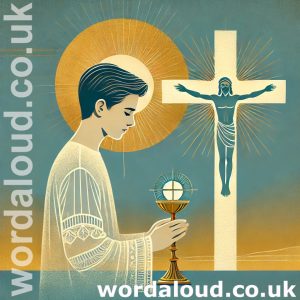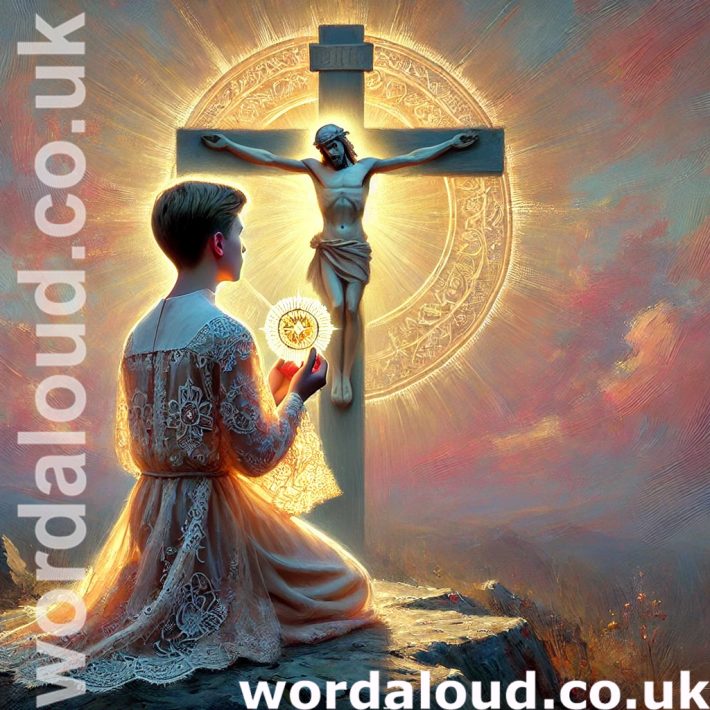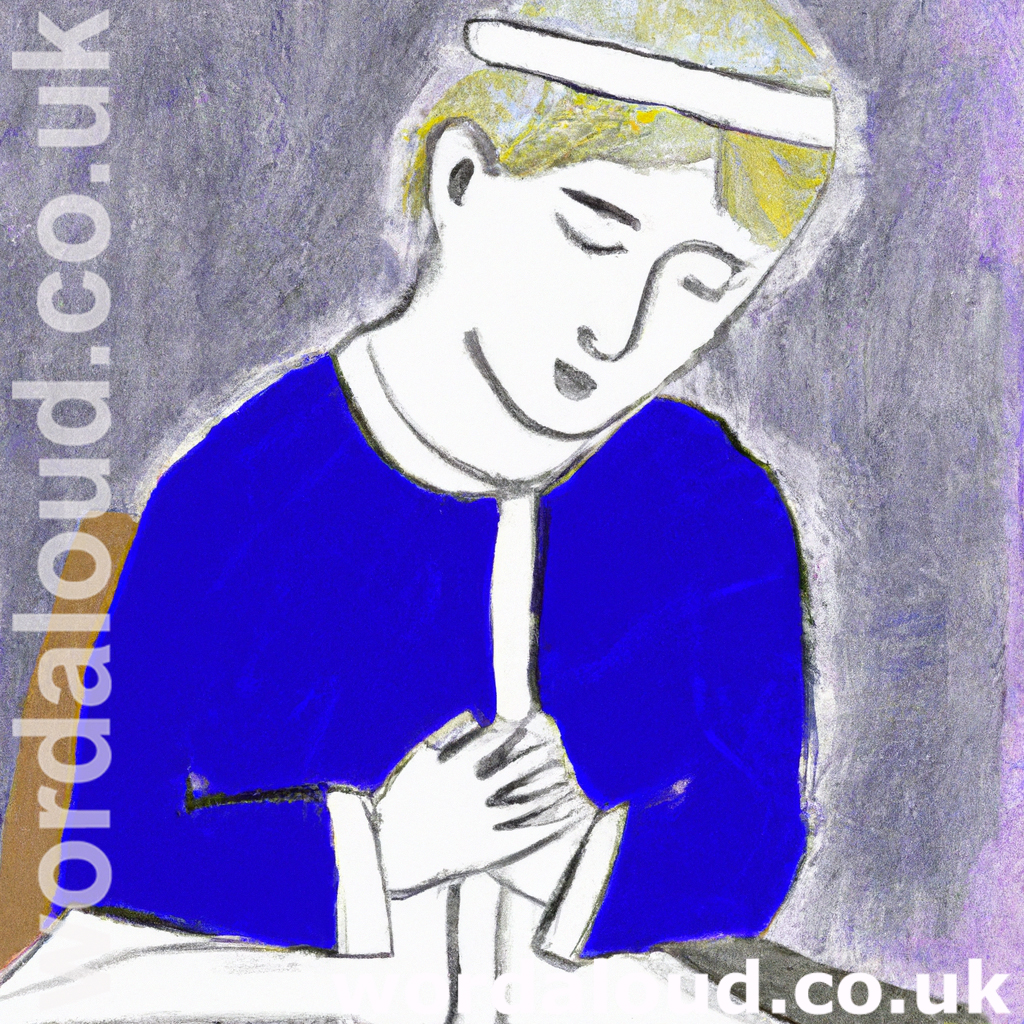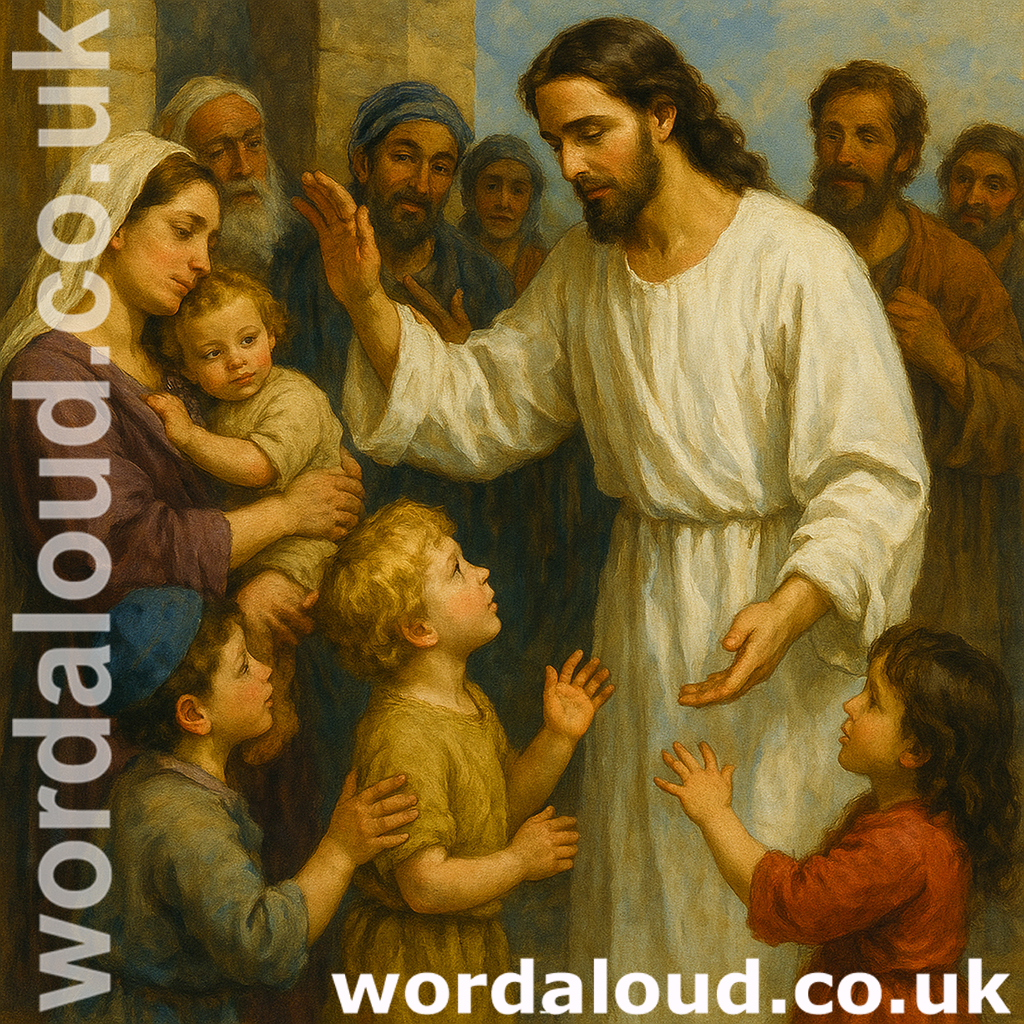Christian Art | A Boy At Prayer With Jesus In The Eucharist | Jesus’ Passion
Office Of Readings | Eastertide Week 5, Thursday | A Reading From A Treatise Of Saint Gaudentius | The Eucharist Is Jesus’ Passion
‘The Eucharist is the Lord’s Pasch – Jesus’ Passion.’
Entering The Mystery Of Jesus
Saint Gaudentius of Brescia (c. 5th century) was a bishop and gifted preacher in Northern Italy, a contemporary and friend of Saint Ambrose. His teaching on the Eucharist reveals the rich sacramental theology of the early Church—faithful to Scripture, shaped by apostolic tradition, and full of pastoral insight.
This passage draws us deep into the heart of Christian worship: the Eucharist. Here, bread and wine become the very body and blood of Christ. Through this transformation, the faithful participate in the Paschal Mystery—Christ’s Passion, Resurrection, and glorification.
‘One Man Has Died For All…’
The treatise begins with the mystery of Christ’s universal sacrifice:
‘One man has died for all, and now in every church… he heals those for whom he is offered…’
This alludes to 2 Corinthians 5:14: ‘One has died for all; therefore all have died.’ Christ’s death was not symbolic—it was real, sufficient, and for all. His sacrifice is now made present in every Eucharistic celebration, not by repetition but by representation—the one eternal offering of Calvary is made accessible in time.
Here, Gaudentius affirms the Eucharist as a healing sacrifice. Christ gives life to the believer and sanctifies the Church through this sacred meal. The Eucharist isn’t just a memorial—it is the life-giving flesh and blood of the Risen Lord, given to sanctify and heal.
Bread And Wine | Not Just Symbols
‘This is the flesh of the Lamb; this is his blood…’
Gaudentius echoes John 6:51 and the words of the Last Supper. He strongly affirms the Real Presence—that the bread and wine, through Christ’s promise and divine power, become truly his body and blood. This is not metaphor but mystical reality.
He links the bread to the flesh of Christ, the Lamb of God, and the wine to his blood, shed in sacrifice. This draws on the Jewish Passover, where the blood of the lamb saved the Israelites in Egypt (Exodus 12). Christ is the new and eternal Passover Lamb.
Typology And Prophecy
Gaudentius enriches his teaching with a reference to Genesis 49:11:
‘He will wash his tunic in wine and his cloak in the blood of the grape.’
This verse, spoken by Jacob in blessing Judah, is seen as a prophecy of Christ. His ‘tunic’ symbolizes the human nature he assumed, and his blood, poured out in the Passion, purifies it. The ‘blood of the grape’ is a striking image of the Eucharistic wine, which becomes his blood.
This prophetic reading connects Old Testament imagery with the New Covenant sacrament. In Christ, all Scripture finds fulfillment.
Transformation By Christ
‘He brought forth bread from the earth and changed it into his own body.’
This language anticipates what the Church would later define as transubstantiation—the transformation of the substance of bread and wine into Christ’s body and blood, though the outward appearances (the ‘accidents’) remain.
Gaudentius explains this change by invoking Christ’s divine power. The One who turned water into wine (John 2) can certainly turn wine into blood. He is both Creator and Redeemer—he who made all things can transform them in the service of salvation.
The Lord’s Passove | A Heavenly Meal
‘It is the Lord’s passover—that is, the Lord’s passing.’
This is a beautiful spiritual interpretation. Just as the first Passover marked God’s saving action in history, the Eucharist marks Christ’s passage into the elements. The bread and wine are no longer ordinary food. Christ has ‘passed over’ into them—they are now heavenly, bearing his very presence.
The Eucharist, then, is not merely a ritual—it is a divine event, a participation in the eternal reality of Christ’s death and resurrection.
The Words Of Jesus: ‘This Is My Body…’
‘We are no longer to look upon the bread and wine as earthly substances… What you receive is the body of him who is the heavenly bread…’
Gaudentius is adamant: we must believe Christ’s words. At the Last Supper, Jesus did not say, ‘This symbolizes my body.’ He said, ‘This is my body.’ This literal language, found in all Gospel accounts and reaffirmed by Saint Paul (1 Cor. 11:24), forms the basis for Eucharistic realism.
Faith is essential. Gaudentius urges believers not to waver. The senses may still perceive bread and wine, but faith perceives the truth: Christ is truly present.
Responding To Doubt
‘This teaching is too hard…’
Gaudentius anticipates objections—just as the crowd did in John 6 when Jesus spoke of eating his flesh. People were scandalized. Even today, some hesitate at the claim of the Real Presence. Gaudentius responds with Jesus’ own words:
‘It is the spirit that gives life; the flesh is of no avail.’
He clarifies: ‘flesh’ here refers to unspiritual thinking—an interpretation that stops at appearances and fails to grasp spiritual truth. When Jesus speaks of his body and blood, he speaks spiritually, but not figuratively. His words are life because they carry the power of the Spirit, who reveals divine mysteries.
The Eucharist Today: Living The Mystery
Gaudentius’s theology remains profoundly relevant. In the Eucharist, Christ:
- Heals the wounded soul,
- Sanctifies the faithful,
- Feeds us with his very self,
- Unites us to his one sacrifice on the Cross,
- And prepares us for the heavenly banquet.
This is not private spirituality—it is public, ecclesial, and transformative. Every time we receive the Eucharist, we participate in the mystery Gaudentius describes: the Paschal passing of Christ into our midst, into our bodies, into our hearts.

A Reading From A Treatise Of Saint Gaudentius | The Eucharist Is Jesus’ Passion
One man has died for all, and now in every church in the mystery of bread and wine he heals those for whom he is offered in sacrifice, giving life to those who believe and holiness to those who consecrate the offering. This is the flesh of the Lamb; this is his blood. The bread that came down from heaven declared: The bread that I will give is my flesh for the life of the world. It is significant, too, that his blood should be given to us in the form of wine, for his own words in the gospel, I am the true vine, imply clearly enough that whenever wine is offered as a representation of Christ’s passion, it is offered as his blood. This means that it was of Christ that the blessed patriarch Jacob prophesied when he said: He will wash his tunic in wine and his cloak in the blood of the grape. The tunic was our flesh, which Christ was to put on like a garment and which he was to wash in his own blood.
Creator and Lord of all things, whatever their nature, he brought forth bread from the earth and changed it into his own body. Not only had he the power to do this, but he had promised it; and, as he had changed water into wine, he also changed wine into his own blood. It is the Lord’s passover, Scripture tells us, that is, the Lord’s passing. We are no longer to look upon the bread and wine as earthly substances. They have become heavenly, because Christ has passed into them and changed them into his body and blood. What you receive is the body of him who is the heavenly bread, and the blood of him who is the sacred vine; for when he offered his disciples the consecrated bread and wine, he said: This is my body, this is my blood. We have put our trust in him. I urge you to have faith in him; truth can never deceive.
When Christ told the crowds that they must eat his flesh and drink his blood, they were horrified and began to murmur among themselves: This teaching is too hard; who can be expected to listen to it? As I have already told you, thoughts such as these must be banished. The Lord himself used heavenly fire to drive them away by going on to declare: It is the spirit that gives life; the flesh is of no avail. The words that I have spoken to you are spirit and life.
Glossary Of Terms
Eucharist
The sacrament of the Body and Blood of Jesus Christ, instituted at the Last Supper. From the Greek eucharistia, meaning ‘thanksgiving’. It is both a memorial and a real participation in the Paschal Mystery of Christ.
Passover (Pascha)
Originally a Jewish feast commemorating Israel’s deliverance from slavery in Egypt. In Christian theology, it refers to Christ’s ‘passing over’ from death to life, and his transformation of the bread and wine into his Body and Blood.
Paschal Mystery
The Passion, death, Resurrection, and Ascension of Jesus Christ. In the Eucharist, this mystery is made present and active for the faithful.
Real Presence
The doctrine that Jesus Christ is truly and substantially present in the Eucharist—body, blood, soul, and divinity—under the appearances of bread and wine.
Transubstantiation
The theological term (defined at the Fourth Lateran Council and the Council of Trent) describing the change of the substance of bread and wine into the Body and Blood of Christ, even though the accidents (appearance, taste, texture) remain.
Sacrament
A visible sign instituted by Christ to confer grace. The Eucharist is one of the seven sacraments and is considered the ‘source and summit’ of Christian life.
Lamb of God
A title for Jesus that emphasizes his sacrificial death, recalling the Passover lamb whose blood saved the Israelites. John the Baptist calls Jesus the ‘Lamb of God’ in John 1:29.
Heavenly Bread
A title for Christ, referring to the Bread of Life discourse in John 6. Jesus calls himself ‘the bread that came down from heaven’.
Sacred Vine
A title Jesus gives himself in John 15:1—’I am the true vine’. In Eucharistic theology, this is connected to the wine that becomes his blood.
Mystical
Pertaining to a spiritual or supernatural reality. In this context, the Eucharistic transformation is mystical, not visible or material in the usual sense, but real and divine.
Typology
A method of biblical interpretation where events or symbols in the Old Testament prefigure Christ and the New Covenant (e.g., the Passover lamb prefiguring Christ’s sacrifice).
Genesis 49:11
A verse from Jacob’s blessing of Judah, interpreted by the Church Fathers as a prophecy of Christ. The imagery of washing garments in wine points to the Passion and Eucharistic wine.
Faith
In this context, the supernatural virtue by which we believe all that God has revealed, including the Real Presence of Christ in the Eucharist—even when unseen.
The Flesh is of No Avail
A phrase from John 6:63, often misunderstood. Here, ‘flesh’ refers to unspiritual or superficial understanding, not a denial of the Eucharist’s literal meaning.
Consecration
The part of the Mass where the bread and wine are changed into the Body and Blood of Christ through the words and actions of the priest, acting in persona Christi (‘in the person of Christ’).








